How to Kill Aphids on Plants: 8 Tips & Tricks
-
Pete Ortiz
- Last updated:
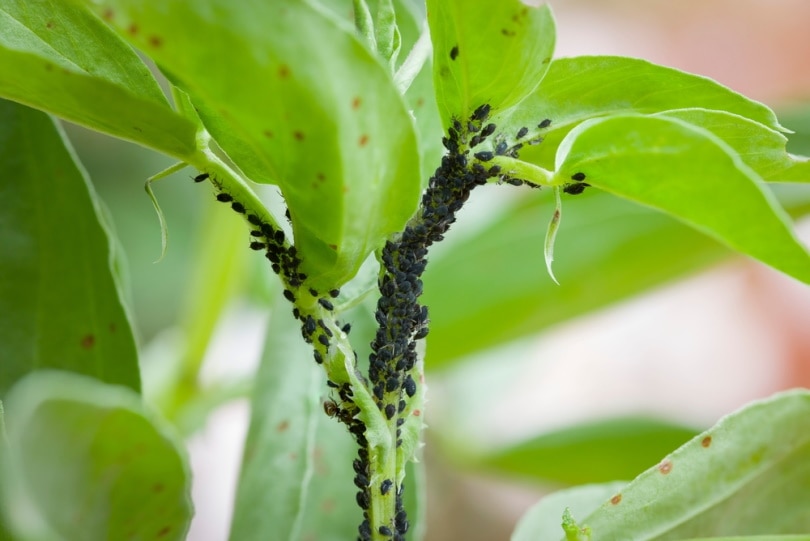
Aphids are small, soft-bodied insects that feed on the sap that plants produce. These destructive insects suck the nutrient-rich liquids, which can severely and permanently cause damage to your plants. The biggest issue with aphids is that they multiply rapidly, so once you notice them on the leaves of your plants, it is crucial to act as soon as possible to eradicate them.
The good news is that aphids are slow which means that you can eliminate them by using only natural or homemade remedies. In this article, you can find some of the best ways to eradicate aphids that won’t harm you, your animals, or your garden.
Why Aphids Are Dangerous to Your Garden
Aphids feed on the phloem sap that plants produce, taking away the necessary minerals from plants while injecting their toxins into the plant, drastically weakening it. By feeding on the beneficial sap these plants produce, aphids cause a metabolic imbalance that damages the leaves and even leads to leaf loss.
One of the biggest problems aphids cause to your garden is the transmission of viruses among plants. They can transfer viruses from one affected plant onto another in a matter of moments. If you don’t treat aphid infestations in time, in most cases, it can lead to the progressive destruction of your entire garden.
The 8 Natural Ways to Kill Aphids on Plants
1. Vinegar
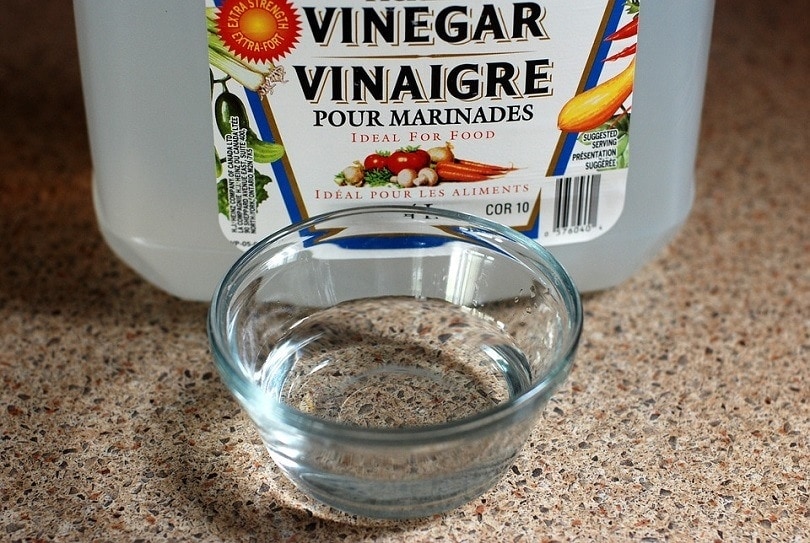
- Mix vinegar with water in a 1 to 10 ratio, and add a few drops of dish detergent.
Using vinegar in a fight with aphids is the most common solution many gardeners use simply because of its high effectiveness. Pour the vinegar into a spray bottle and thoroughly spray every part of the leaf. Always spray even the underside of the leaf as the aphids may be hiding underneath. After creating the solution of diluted vinegar and water, you will achieve a perfect acidity level.
2. Baking Soda
- ⅓ of a teaspoon of baking soda with 0,26 gallons of warm water, half a teaspoon of vegetable oil, few drops of detergent.
Baking soda is an excellent solution that is effective not only with aphids but with other pests. After mixing the baking soda and water, you can add a few drops of dish soap to make the solution adhere better, which is optional. You can pour this remedy into a spray bottle or wipe the affected leaves with a cloth dipped in the solution; either way, repeat the process twice a week.
3. Insecticidal Soap
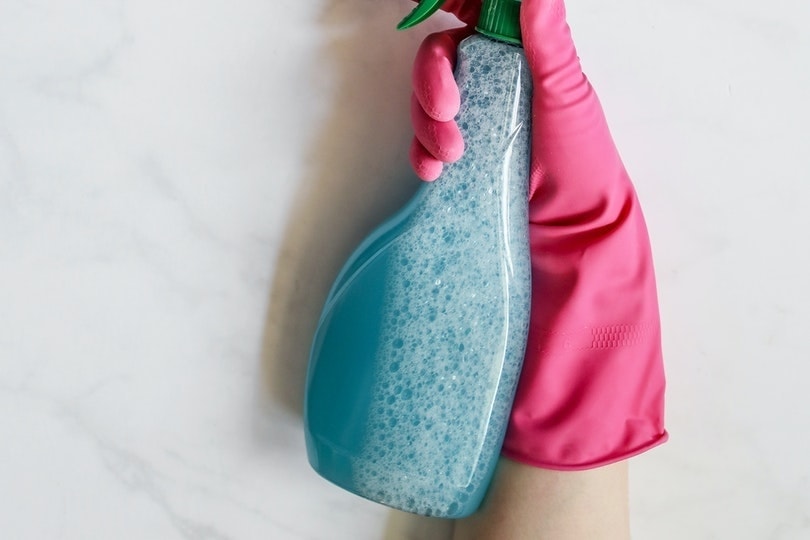
- Two and ½ tablespoons of pure-castile liquid soap, two tablespoons of vegetable oil, and one gallon of water.
Insecticidal soap is a great way to suffocate aphids without being absorbed by the plant’s leaves. It targets the aphid eggs precisely without harming your plants. These products typically come pre-mixed, and you can easily acquire them in outdoor supply stores and plant nurseries. If you acquire the pre-mixed insecticidal soap, read the instructions beforehand, as it can harm some plants. On the other hand, if you’d like to create your solution, you can quickly achieve this by mixing castile soap with water.
4. Beneficial Bugs
- Choose plants that attract helpful insects and predators, and purchase eggs, larvae, or live specimens of insects that are beneficial to your garden.
One way to create a balance in your garden and eliminate unwanted pests is to introduce beneficial bugs such as ladybugs, green lacewings, jumping spiders, hoverflies, praying mantis, or parasitoid wasps. When introducing these insects, you will drastically impact your garden by lowering the population of destructive pests and restoring balance and order. You can attract insects like ladybugs by choosing plants to draw them to your garden. Some plants that ladybugs will love are parsley, sunflower, geraniums, and sweet alyssum.
5. Garlic or Onion
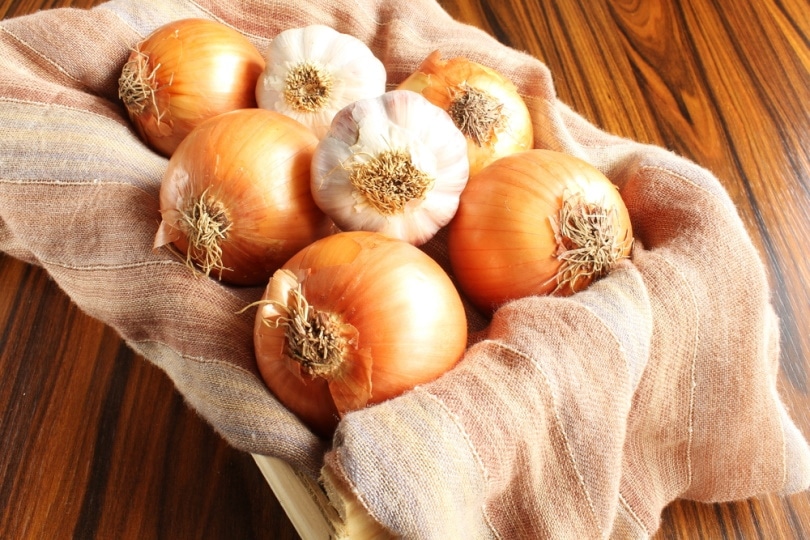
- A full head of garlic, two cups of hot water, one tablespoon of dish soap, and one tablespoon of hot pepper. Let that sit overnight and pour it into a spray bottle.
Another highly efficient way to fight destructive pests such as aphids is to create a potent, natural homemade extract. This natural remedy is straightforward, and one vegetable is a perfect solution you can find in your kitchen right now. Onions and garlic are an ideal solution to pest infestations, as they are very effective in reducing aphids in your garden and fungal plant diseases. The most rewarding part about these natural mixtures is that they don’t kill the plants or the bugs; they just make the leaves so stinky that they will repel all insects.
6. Water
- Spray the underside of the leaves with a hose and a high-quality spray nozzle. Repeat the process every morning until effective.
Sometimes the simplest solution is the most effective one. If you dislodge the aphids with water, they will fall onto the ground and hopefully won’t remember their way back to the plant. It would be best to spray the infested leaves in the morning to let the plant dry in the sun as soon as possible; that way, you will avoid developing fungus on the leaves.
7. Blend of Essential Oils
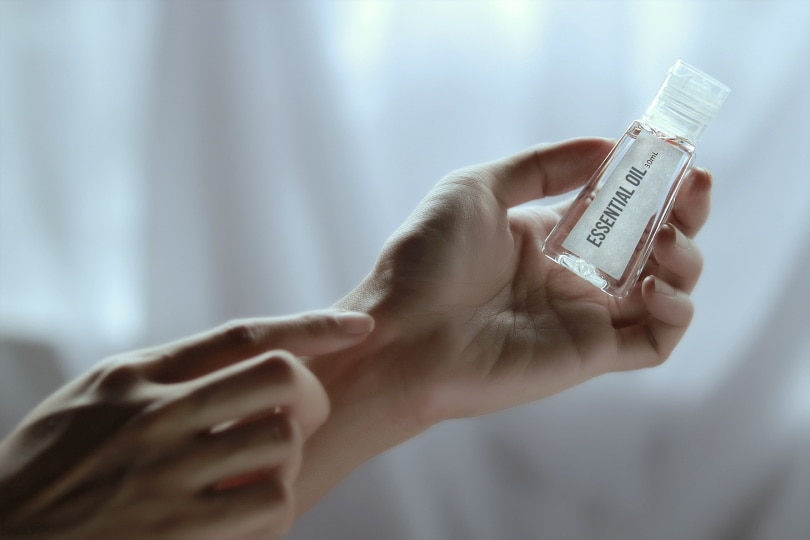
- Pour 4 to 5 drops of several essential oils per your choice, and dilute with water. Pour the solution into a spray bottle and spray on the affected leaves.
Specific blends of essential oils have proven to be effective in the fight against aphids, but it is crucial to know which essential oils are the right ones for this homemade project. The most effective essential oils you can use are peppermint, clove, lavender, oregano, and rosemary. To ensure you only target pests and don’t harm your plants, dilute the oils with water or soap.
8. Neem Oil
- Two tablespoons of neem oil, one gallon of water, and one tablespoon of mild dish soap. Start by mixing the solution and then pour it into a spray bottle. Spray the leaves in the mornings or evenings.
Neem oil is one of the gardener’s favorite solutions to eliminating destructive pests. It targets pests that damage garden plants and won’t harm the plants, humans, or animals. You can buy pre-mixed neem oil, although homemade versions have proven to be much more effective and potent. It is best to spray the neem oil in the morning or the evening since the intense sun mixed with this insecticide can burn the leaves. Neem oil doesn’t harm birds or other beneficial insects in any way.
Final Thoughts
This article aims to inform you of the best ways of eradicating aphids. These eight remedies will target only aphids and other insects that are harmful to your garden without harming your plants or humans. You can easily mix these natural remedies using materials you gather at home; just follow the instructions to get the best possible results.
- See Also: 25 Types of Trees in California
- 4 Ways to Get Rid of Aphids – wikiHow
- Get Rid Of Aphids Naturally: Tips And Tricks.
- Aphid Pest Control: 5 Natural Ways to Get Rid of Aphids
- How To Get Rid of Aphids? 5 Proven Home Remedies for Aphids
- 8 Natural Ways to Get Rid of Aphids – Brown Thumb Mama®
- How to Get Rid of Aphids on Plants | The Old Farmer’s Almanac.
- Aphid Proof Your Plants With These Prevention Methods – Green Thumb Nursery
Featured Image Credit: Paul Maguire, Shutterstock
Contents


